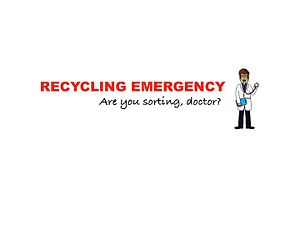First assignment of group n° 002
Resources used by the team[modifier | modifier le wikicode]
First description of our project[modifier | modifier le wikicode]
Recycling emergency : Are you sorting, doctor ?
1. How to optimize selective sorting in hospitals ?
Our in-depth research revealed that recycling is proving more and more satisfactory each day. In many kinds of industries, areas or countries, we can hear about circular economy, new companies promoting “second life” products etc. However, right before the recycling phase, we assume that there is a critical issue along the sorting process. And as a matter of fact, if all the garbage that we throw away was effectively sorted, it would take way less time and it would be a lot cheaper to recycle it as new products or components. Thus, as the process of sorting is not completely effective, how can we, at least, improve it ?
First of all, in our approach, we made the choice of focusing on a specific area. Indeed, a global solution that could let billions of people sort their trashes effectively seemed slightly too ambitious at our current scale. That is why we decided to narrow our research, and chose to focus on hospitals in France. Asking around, we found out a majority of hospitals was not sorting its domestic waste effectively. As we may understand, hospitals tend to focus more on the infectious trashes than on the other ones. As a result, various systems were created to sort and destroy toxic garbage in order to protect the employees, the patients and the environment.
But what about domestic waste ? A study showed that domestic waste in hospitals represent between 75% and 90% of the total waste. If we compare the total waste in France (17 millions tons) and the total waste in French hospitals (700 000 tons), we can see that the of the hospitals is relatively low (approximately 4%). Nevertheless, if we manage to fight the problem inside the medical area, we hope that this initiative will encourage emulation and change people’s perspective on sorting.
It is also proven that, in general, 1,5 to 3kg of waste are thrown away per patient per day. With the increase in hygiene and safety measures, the use of single-use packagings has been strinkingly rising and therefore a sustainability issue has emerged. Hospitals are obviously favouring safety over the rest by getting rid of dangerous garbage (infectious waste). This demonstrates that the medical staff has already implemented a kind of sorting process by separating toxic from domestic waste. In a way, one can assume that hospitals have already implemented waste segregation policies. They are just not developed enough.
So, how can we make the sorting easier and more ergonomic in hospitals?
2. Why does this problem exist?
Our research has shown that many hospitals located in big agglomerations only recycle paper and throw everything in the same trash except for infectious waste and medical material. Most of the time, small hospitals located in rural areas are more willing to recycle, compared with larger hospitals. It could be explained by the fact that there is a lack of organisation in selective sorting. Bigger facilities aren’t equipped with the good material to do it (different trashes to separate the waste), they haven’t fitted out some special space for selective sorting and their mindset is focused on the fact that it’s hard to implement and do selective sorting. In addition, to implement new processes, medical facilities needs to deal with the ARS (which stands for “Agence Régionale de Santé”, i.e. Regional Health Agency). This inspection body has the power to accredit, authorize and control the quality of any health facility. Therefore, it demands a lot of effort to make a change in the medical area. We assume that hospital staff feel concerned about sorting and know it is important to do so. However, no one is willing to make the change, because they don’t know where to begin. Can we help them?
3. What breakthrough are you commited to creating?
We aim to offer a way to help hospitals be more efficient in sorting. The questions everyone is asking are “why don’t they sort?” “is it a time issue?” “what do they need?”. The real issue is organization. With that in mind we came up with a few ideas to support hospitals in their sorting issues.
First of all, we thought about the bins. Nowadays, it exists at least two types in each hospital, one for the medical and infectious waste, and the other one, for everything else. So, on the bright side, it means that the staff is already sorting. However, the idea will be to find a way to optimize the process of sorting (with more ergonomic trashes, clearer labels…)
Then, we have also noticed that hospital’s domestic waste (i.e. non infectional waste) was usually made of the same items (medical supply packaging, office waste, kitchen waste…) By focusing on the single-use packaging, we could make the sorting easier : Packaging that can become compost? Create medical supply packaging from the same material, so that the sorting is easier?
To finish, we could find a way to reduce the waste in general.
We hope that this challenge will lead to new opportunities around the world.
Potential experts already identified
- A general practice nurse - Likelihood: 10/10
- A general practice doctor - Likelihood: 7/10
- Direction/ administration's Hospital - Likelihood: 8/10
- Regional Healthy Agency - Inspection Representative - Likelihood: 7/10
- Veolia Propreté - Recycling Specialist - Likelihood: 7/10
- Engineer specialized in Sustainable Performance - Likelihood : 9/10 '
